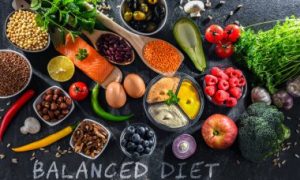
Best Method Of Approaching Nutrition Myth (4 Important Myths)
The best method of approaching nutrition myths is to critically evaluate information, consult reputable sources, and prioritize evidence-based practices for informed and personalized dietary choices. In the labyrinth of nutritional information, where myths masquerade as facts and trends flicker like distant stars, navigating the cosmos of dietary advice can feel like an astronomical challenge.
Amidst the chaos, discerning the best method to approach the enigma of nutrition myths becomes an odyssey of its own. Picture this journey as a cosmic quest, where scepticism is your compass and critical thinking your star map. In this celestial expanse of dietary wisdom, we embark on a voyage to debunk the myths, unravel the constellations of truth, and unveil the stellar secrets of a nourishing reality. Brace yourself, fellow truth-seeker, for the adventure of nutritional enlightenment awaits!

Best Method Of Approaching Nutrition Myth
Approaching Nutrition Myths: Debunking Common Misconceptions with Precision
In unraveling the web of nutrition myths, the most effective approach involves a discerning analysis of scientific evidence, steering clear of anecdotal advice. A meticulous examination of popular beliefs and their scientific validity is key to dispelling misinformation and fostering a truly informed approach to nutrition.
Navigating the Nutritional Maze: A Strategic Approach
In this complex web of dietary advice, it’s crucial to discern between evidence-based information and unfounded claims. One prevalent myth is the notion that a single food or supplement holds the key to optimal health, overlooking the importance of a balanced and varied diet. Another misconception involves the demonization of entire food groups, perpetuating the idea that certain macronutrients are inherently harmful. To navigate this maze successfully, individuals should prioritize critical thinking, consult reputable sources, and recognize that nutritional needs vary among individuals.
Decoding Misinformation: The Power of Evidence-Based Analysis
Decoding misinformation in nutrition is paramount to fostering a healthier society. The prevalence of nutrition myths can lead individuals down paths of poor dietary choices, impacting their well-being. Evidence-based analysis serves as a powerful tool in dispelling these myths, providing a solid foundation for informed decision-making.
By critically examining scientific research and separating fact from fiction, you can challenge prevailing misconceptions surrounding food and nutrition. This approach empowers individuals to make choices based on reliable information, promoting a more accurate understanding of dietary needs and contributing to overall public health. In the era of information overload, embracing evidence-based analysis becomes crucial in navigating the complex landscape of nutrition, helping individuals make choices that align with both their personal well-being and the broader scientific consensus.
Language Matters: Addressing Misleading Terminology
To effectively tackle nutrition myths, one must confront misleading terminology head-on. “Low-fat,” “sugar-free,” and “organic” are often used ambiguously, necessitating a closer examination of nutritional labels and a nuanced understanding of how these terms may be misinterpreted. This linguistic precision is crucial in cultivating a genuine understanding of dietary choices.

Empowering Through Education: The Role of Clear Communication
In the quest to debunk nutrition myths, clear communication is a potent weapon. Use terms like “balanced diet,” “nutrient density,” and “portion control” to empower individuals with actionable insights. Cultivating a language that promotes nutritional literacy fosters a society equipped to navigate the complexities of dietary information, ultimately dispelling myths and promoting genuine well-being.

Identifying Common Nutrition Myths
Overview of Widespread Myths
In navigating the labyrinth of dietary information, it’s crucial to demystify prevalent nutrition myths. These misconceptions often circulate with fervor, fueled by buzzwords like “superfoods,” “detox diets,” and “miracle supplements.” Separating fact from fiction requires a critical eye, as myths like “carbs are the enemy” and “eating late leads to weight gain” persist. Unraveling these fabrications is essential for fostering informed nutritional choices.
Impact on Dietary Choices
The pervasive influence of nutrition myths significantly shapes individuals’ dietary decisions. Misguided notions such as “skipping meals aids weight loss” can lead to imbalanced nutrition. Terms like “calorie counting” and “fad diets” are frequently associated with these misguided beliefs, contributing to a culture of quick fixes. Consequently, people may opt for restrictive eating patterns, neglecting essential food groups and compromising overall health.
Influence on Health Behaviors
Nutrition myths wield a profound impact on health behaviors, steering individuals toward questionable practices. The allure of “magic weight loss pills” and “fad diet success stories” can overshadow evidence-based approaches. Correcting these misconceptions is paramount for promoting sustainable health habits, fostering a mindset where nutritional decisions are rooted in scientific understanding rather than popular buzz.
Understanding the Origins of Nutrition Myths
Cultural Influences
Unraveling the roots of nutrition myths requires delving into the intricate tapestry of cultural influences. The narrative around food often intertwines with deep-seated traditions, societal norms, and historical practices. These pervasive cultural beliefs can lead to the perpetuation of nutrition myths, as individuals embrace dietary notions passed down through generations. Unraveling these cultural threads is essential for dispelling misconceptions and fostering a more informed approach to nutrition.
Misinterpretation of Scientific Studies
Navigating the landscape of nutrition myths demands a critical examination of how scientific studies can be misconstrued. The journey from research findings to popular understanding is often fraught with pitfalls. Ambiguous interpretations, selective reporting, and the oversimplification of complex data contribute to the dissemination of inaccurate nutritional information. Untangling these misinterpretations is pivotal for cultivating a nuanced comprehension of scientific studies and fostering a discerning public.
Media and Celebrity Endorsements
Understanding the genesis of nutrition myths necessitates scrutinizing the impact of media and celebrity endorsements. The allure of celebrity-endorsed diets and trends can overshadow evidence-based nutritional principles. Media platforms, fueled by sensationalism, can inadvertently perpetuate myths, amplifying unverified claims. Decoding the influence of media and navigating through the noise of celebrity endorsements is vital for individuals seeking reliable nutritional guidance in an era dominated by digital information.
In exploring the origins of nutrition myths, it becomes evident that cultural influences, scientific study misinterpretations, and media and celebrity endorsements play pivotal roles. Untangling these intricacies requires a discerning approach, dissecting cultural narratives, critically evaluating scientific information, and navigating the media landscape. By doing so, individuals can foster a more informed understanding of nutrition, steering clear of myths that may impede their journey to a healthier lifestyle.
Critical Thinking in Nutrition
In the realm of nutrition, science plays an indispensable role, anchoring dietary recommendations in the robust framework of evidence-based principles. These principles, backed by rigorous scientific research, form the bedrock of our understanding of nutritional requirements and their impact on health. Peer-reviewed research, characterized by its meticulous scrutiny from experts in the field, ensures the reliability and credibility of nutritional information. This validation process sifts through various studies, emphasizing the importance of trustworthy sources in shaping dietary choices.
In navigating the intricacies of nutritional science, it becomes crucial to discern between correlation and causation. This skill prevents the misinterpretation of data and promotes a nuanced understanding of how factors may relate to each other. Distinguishing correlation from causation is vital, as it dispels misconceptions and guides individuals toward informed dietary decisions. People often express the need for “evidence-backed nutrition” and “research-based dietary guidance,” highlighting the growing demand for scientifically validated information. By embracing these principles and fostering awareness of the correlation-causation dichotomy, the role of science in nutrition transcends mere information dissemination, actively guiding individuals towards healthier and more informed dietary choices.
The Role of Science in Nutrition
Science plays a pivotal role in shaping our understanding of nutrition, employing a foundation built on evidence-based principles. In the realm of nutrition, evidence-based practices involve scrutinizing research findings and clinical studies to draw conclusions about the impact of various dietary factors on health. This methodology relies on the scientific method, emphasizing systematic observation, experimentation, and rigorous analysis.
Peer-reviewed research, a cornerstone of evidence-based nutrition, ensures that studies undergo thorough evaluation by experts in the field before publication. This process enhances the reliability and credibility of the information disseminated to the public, fostering a trustworthy knowledge base for dietary choices.
It is crucial to recognize the significance of differentiating between correlation and causation in nutritional science. While two variables may show a statistical association, it is imperative to avoid prematurely attributing causation without substantial evidence. This discernment is vital to prevent misconceptions and guide individuals toward informed dietary decisions.
Debunking Specific Nutrition Myths
Myth 1: “Carbs are the Enemy”
Carbohydrates, often unfairly vilified, are a vital energy source for the body. Contrary to the myth, not all carbs are detrimental; they come in various forms such as sugars, fibers, and starches. In a balanced diet, carbs play a crucial role in providing immediate energy and supporting overall bodily functions. Debunking common misconceptions, it’s essential to recognize that not all carbs are created equal—focus on whole grains, fruits, and vegetables for sustained energy and optimal health.

Myth 2: “Eating Fat Makes You Fat”
Understanding the types of fats is key to dispelling this myth. Healthy fats, such as those found in avocados and nuts, are essential for brain function, hormone production, and overall well-being. Contrary to the misconception, it’s not about avoiding fats but rather choosing the right ones. Debunking fat-related myths involves emphasizing the importance of monounsaturated and polyunsaturated fats while limiting saturated and trans fats for a balanced and healthful diet.
Myth 3: “Skipping Meals Leads to Weight Loss”
To debunk this myth, understanding metabolism is crucial. Skipping meals can actually slow down metabolism, making weight loss more challenging. It’s vital to recognize the impact of irregular eating patterns on the body’s ability to burn calories efficiently. Promoting sustainable eating habits involves emphasizing regular, balanced meals to keep metabolism steady and support a healthy weight over time.
Myth 4: “All Calories Are Equal”
Quality, not just quantity, matters when it comes to calories. Nutrient density, or the nutritional value per calorie, is a critical factor often overlooked. Debunking caloric myths involves shifting focus from mere calorie counting to considering the nutritional content of food. Opting for nutrient-dense choices ensures that the body receives essential vitamins and minerals, contributing to overall health and debunking the oversimplified idea that all calories are created equal.
Promoting Nutritional Literacy
Promoting Nutritional Literacy is a pivotal aspect of fostering healthier communities.
Educational Initiatives
Educational initiatives play a crucial role in this endeavor, involving programs and campaigns designed to enhance public understanding of nutrition. These initiatives aim to empower individuals with the knowledge to make informed dietary choices.
Incorporating Nutrition Education
Incorporating nutritional education in Schools is a cornerstone of this effort. Schools serve as key platforms for imparting fundamental nutritional knowledge to young minds, ensuring they develop a strong foundation in healthy eating habits.
Encouraging Lifelong Learning about Nutrition
It is imperative for sustained well-being. Emphasizing continuous education beyond formal settings, such as workshops and community events, reinforces the importance of making mindful food choices throughout one’s life. Promoting Nutritional Literacy is not just a short-term goal but a lifelong commitment to health and wellness. Embrace the journey towards informed nutrition choices for a vibrant and nourished future.
Media Literacy in Nutrition
Media literacy in nutrition is an indispensable skill in today’s information-saturated world, demanding a critical eye when analyzing media messages It involves deciphering the nuances of nutritional content presented through various channels, such as websites, social media, and traditional news outlets. Embracing media literacy in nutrition empowers individuals to distinguish between evidence-based advice and sensationalized claims, fostering a more informed and health-conscious society.
Public Health Campaigns
Collaboration between Healthcare Professionals and Media
In the realm of public health campaigns, a symbiotic relationship between healthcare professionals and the media is crucial. The synergy between these two entities harnesses the power of information dissemination to the masses. This dynamic collaboration not only fosters health literacy but also fortifies community resilience.
As healthcare experts and media outlets join forces, the amplification of health messages becomes paramount, ensuring a widespread understanding of preventive measures and wellness practices. The dialogue between these stakeholders sparks a cascade of informed decisions, promoting holistic well-being.
The Role of Government in Nutrition Education
Government involvement in nutrition education stands as a cornerstone of public health initiatives. By spearheading comprehensive programs, authorities play a pivotal role in fostering a culture of informed food choices. Empowering citizens with nutritional knowledge becomes a governmental responsibility, enhancing overall health outcomes.
Through strategic policies and outreach efforts, the government acts as a catalyst for positive dietary habits. The synthesis of policy advocacy and educational campaigns creates a robust framework for sustainable health improvements.
Grassroots Initiatives for Community Awareness
At the heart of public health progress lie grassroots initiatives that galvanize community awareness. These endeavors, often led by passionate individuals or local organizations, permeate the fabric of society. Through community-driven campaigns, awareness is not merely disseminated but woven into the very ethos of neighborhoods.
Grassroots initiatives thrive on inclusivity, engaging diverse populations in the dialogue of health. This bottom-up approach instils a sense of ownership, transforming individuals into proactive advocates for their own well-being.
Frequently Asked Questions (FAQ) about best method of approaching nutrition myth
Q1: What is the best method for approaching nutrition myths?
A: The best method for approaching nutrition myths involves a critical and evidence-based mindset. Always prioritize information from reputable sources such as registered dietitians, nutritionists, and scientific studies.
Q2: How can I distinguish between a nutrition myth and a scientifically supported fact?
A: To distinguish between nutrition myths and scientifically supported facts, look for consensus among experts, peer-reviewed studies, and evidence-based guidelines. Be cautious of sensationalized claims and always consider the source’s credibility.
Q3: Are there common red flags that indicate a nutrition myth?
A: Yes, common red flags include promises of quick fixes, extreme claims without scientific backing, and one-size-fits-all solutions. Be skeptical of information that lacks nuance or seems too good to be true.
Q4: Is it necessary to consult a professional when evaluating nutrition information?
A: Yes, consulting a registered dietitian or nutrition professional is crucial for personalized advice. They can help you navigate through myths, tailor recommendations to your individual needs, and provide evidence-based guidance.
Q5: How can I critically evaluate nutrition information found online or in popular media?
A: Practice critical thinking by checking the credentials of the author, verifying information with reputable sources, and looking for a balanced presentation of facts. Be wary of clickbait headlines and sensationalized language.
Q6: Are there specific areas of nutrition where myths are more prevalent?
A: Yes, myths often surround fad diets, supplements, and extreme nutritional practices. It’s important to approach information in these areas with caution, seeking guidance from professionals who can provide evidence-based insights.
Q7: What role do cultural and societal influences play in perpetuating nutrition myths?
A: Cultural and societal influences can contribute to the spread of nutrition myths. Recognizing these influences and staying informed about diverse dietary practices is essential for a well-rounded understanding of nutrition.
Q8: Can anecdotal evidence be reliable when assessing nutrition information?
A: While anecdotes can offer insights, they should not be the sole basis for nutrition decisions. Scientific evidence carries more weight, as it undergoes rigorous testing and validation, providing a more reliable foundation for dietary choices.
Q9: How can I educate others about the importance of dispelling nutrition myths?
A: Share reliable resources, encourage critical thinking, and promote media literacy. Engaging in open and informed discussions helps create awareness about the importance of evidence-based nutrition practices.
Q10: What resources can I trust for accurate and up-to-date nutrition information?
A: Trust resources from reputable health organizations, government agencies, and registered dietitians. Peer-reviewed journals and evidence-based websites are reliable sources for staying informed about the latest in nutrition science.
Conclusion
In conclusion, navigating the realm of nutrition myths requires a discerning and evidence-based approach. The best method involves cultivating a critical mindset, staying informed about reputable sources, and consulting with qualified healthcare professionals or registered dietitians. By recognizing the importance of individualized nutrition, embracing scientific consensus, and avoiding sensationalized claims, individuals can make informed decisions about their dietary choices.
In a landscape filled with contradictory information, the key lies in fostering a balanced and realistic perspective, understanding that nutrition is a complex and evolving science that demands continuous learning and adaptation. Ultimately, the journey towards optimal health is best undertaken with a foundation of knowledge, a willingness to question prevailing beliefs, and a commitment to evidence-based practices.